Wondering how artificial intelligence (AI) will impact your marketing? Looking for AI tools you can begin using now?
To explore what marketers need to know about artificial intelligence and marketing, I interview Paul Roetzer on the Social Media Marketing Podcast.
Paul founded the Marketing AI Institute, the Marketing AI conference, and PR 20/20. He's also the host of the brand-new Marketing AI podcast.
Paul shares some examples of practical applications for AI in marketing and discusses a number of AI tools marketers can use today.
Listen to the Podcast Now
This article is sourced from the Social Media Marketing Podcast, a top marketing podcast. Listen or subscribe below…
Where to subscribe: Apple Podcasts | Spotify | YouTube Music | YouTube | Amazon Music | RSS
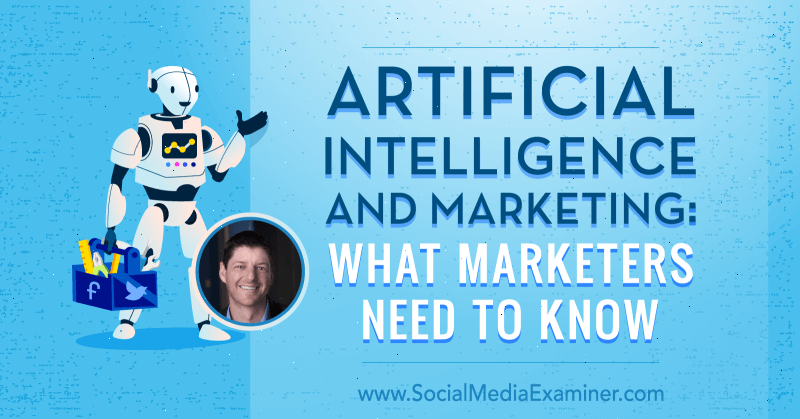
Getting Started in AI
Paul's interest in AI was sparked by IBM's Watson winning on Jeopardy in 2011. Watson defeated Ken Jennings and Brad Rutter, two of the best champions Jeopardy has ever seen. Out of curiosity, Paul began wondering about the AI and natural language processing technology behind Watson.
One of the first things he did was read Automate This by Christopher Steiner. In this book, Paul learned how intelligent algorithms led to disruptions in many different industries. He also discovered how machines can learn on their own, make better predictions, and evolve beyond human assistance. Realizing it was only a matter of time before these advancements would transform sales and marketing, he started on the path of learning everything he could about AI.
Building Marketing Automation Partnerships
In 2012, Paul was 7 years into running his own agency, PR 20/20, and was at the forefront of marketing automation through a partnership with inbound marketing, sales, customer service, and CRM platform, HubSpot. Along with other companies like Marketo, Pardot, and Eloqua, marketing technology and automation was being funded with billions of dollars, but was still largely elementary and human-driven at the time.
Naturally, Paul began pondering what's next and how marketing automation could evolve from there. Based on everything he was observing, he knew that machines would soon able to learn, adapt, and improve all of the things that humans were still relying on other humans to do.
Launching the Marketing AI Institute and Marketing AI Conference
In 2014, Paul published his second book, The Marketing Performance Blueprint, in which he examined different organizations struggling to achieve their performance goals. In the book, Paul writes about the three major gaps that existed in these companies: talent, tech, and strategy. The basic premise of the book establishes that not having the right people or the right technology prevents companies from building the optimal strategy to achieve their goals.
In only 700–1,000 words out of 50,000 in the entire book, Paul also highlighted how automation technology, the future of intelligent automation, and the technology behind Watson apply to marketing. Yet this section became the main focus and the thing that everyone wanted to speak to Paul about.
This prompted Paul to start doing talks at conferences like SXSW in 2015 about his theories on the origins of marketing intelligence and the potential it holds. The technology was there but no one was fully embracing it yet. He briefly toyed with the idea of starting his own software company to build an intelligence engine to automate marketing strategy.
Get World-Class Marketing Training — All Year Long!
Are you facing doubt, uncertainty, or overwhelm? The Social Media Marketing Society can help.
Each month, you’ll receive training from trusted marketing experts, covering everything from AI to organic social marketing. When you join, you’ll also get immediate access to:
- A library of 100+ marketing trainings
- A community of like-minded marketers
- Monthly online community meetups
- Relevant news and trends updates
A year later, Paul realized that he wasn't equipped nor prepared to take on that project. It would take at least 10 years and probably a billion dollars. There were still a lot of unknowns and the process was far too complex. Although he simply wasn't the right person to try to do all of this as a software company, he was uniquely positioned and far more qualified to tell the story of AI and help other marketers understand it as PR 20/20, which was a largely content marketing agency.
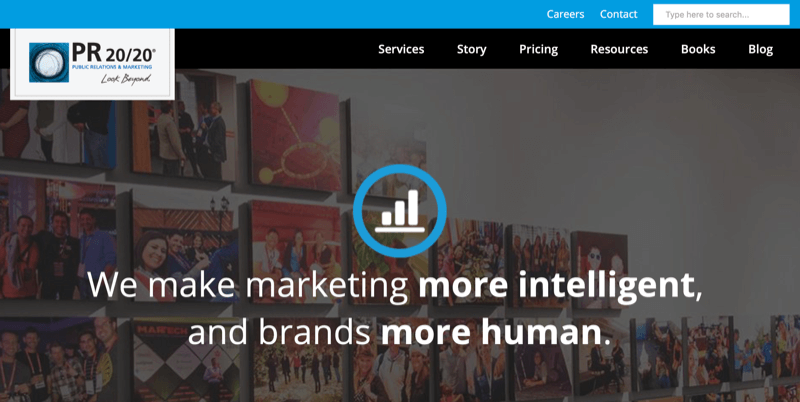
Paul set out to help marketers make sense of AI and learn to apply it through a blog powered by PR 20/20 called the Marketing AI Institute. In January 2019, Paul split it into its own company and the Marketing AI Conference became the cornerstone of that entity.
Why Marketers Should Pay Attention to AI
AI Impacts Daily Life
Paul predicts that AI is going to have trillions of dollars in annual impact on businesses. There are literally dozens of consumer applications for it on a daily basis, from Netflix recommending a show to watch and Google Maps rerouting you around an accident to Amazon predicting what you'll buy next and Gmail finishing your sentences. Yet most people have no clue what it is and how it works because they don't realize machine learning is performing these tasks.
AI is making your life better by making things more convenient and personalized and the same thing is happening in marketing and sales. The software we use is just going to get smarter over time. With it, marketers will have the ability to personalize and do things at scale in a way that's currently limited by human-only-powered marketing.
Al Will Transform Marketing Careers
AI can help your business make better marketing decisions and lead customers to your brand. New technology will transform our jobs as marketers, just as it's transformed everything else in our lives. It means new career paths will open up and our jobs will be more enjoyable.
A lot of marketers will be amazed by the results in 3 years, but only a certain segment will understand the potential of intelligent software now and find these tools today. By doing this, they're giving themselves a multi-year head start on their peers who are still afraid of exploring AI. Perhaps the topic is too abstract or overwhelming to try to understand. Whatever the reason, brands that don't find smarter ways to do their marketing will be left in the dust by their competitors that do.
Consumers Expect the Benefits of AI
The past decade has conditioned consumers to give up data and privacy in exchange for personalization and ease of use. People have come to expect a certain level of personalization in the way companies market to them, even in the B2B environment. Anything less than a seamless or frictionless buying experience from companies is frustrating. People want the conveniences that AI can bring.
What Is AI?
From a marketing perspective, there are some fundamental things to know about machine learning and deep learning and how each actually works. The first is that the software powering machines is inherently stupid. Machines can't see, hear, understand, nor speak. AI is simply an umbrella term for making machines “smarter” and giving them human-like capabilities.
For instance, Alexa, Siri, or any other voice assistant doesn't understand anything right out of the box. These tools have been trained to hear the human language, understand what it's saying, process it, and generate the best response to your query.
Predictions About Future Outcomes
 The primary subset of AI is called machine learning. In the simplest terms, it's making predictions about future outcomes based on historical data. This is similar to data science, which has been doing the same thing for decades. The difference is that machine learning improves as more and newer data is made available and it makes predictions in response to this information.
The primary subset of AI is called machine learning. In the simplest terms, it's making predictions about future outcomes based on historical data. This is similar to data science, which has been doing the same thing for decades. The difference is that machine learning improves as more and newer data is made available and it makes predictions in response to this information.
For example, Google Maps is not powered by a human being typing directions to reroute people as they make exits, encounter accidents, or do other things on the road. It uses data points from multiple sources to predict a better path as you drive.
In the daily tasks of your career, you'll find that you're simply making a series of predictions at every moment of your day. Marketers make a series of predictions each day on what to write; where and when to publish it; how much to spend on ads; the colors, art, and design; and much more based on past human behavior. Then they just hope for the best. Each one of these predictions is an instance where machine learning could be applied.
Listen to the show to hear more examples of products that use AI to predict human behavior.
Exploring AI for Your Needs
A lot of companies claim that they leverage AI, when in fact, they don't. This has actually become a major problem in the industry and one that Paul has been tackling for the last couple of years. Many entities will say that they use machine learning, deep learning, or neural nets. It's up to marketers as potential customers to discern whether it's true.
Ask pointed questions about how exactly the technology is used in the process and how it will make your company more efficient and smarter. Challenge the salespeople selling the technology to see if they really understand it. Tell them how long it takes or how much it costs to run a skill or process and ask how their machine can make it faster or eliminate it altogether.
Then have them run through demos and walk-throughs. If you're having trouble understanding the underlying technology, find someone outside the company who can actually explain it to you.
Ways Social Marketers Can Use AI
AI applications are being built for almost anything. If you happen to work for a big enterprise with access to limitless data and budget for tools, the world is yours! Although SMB marketers may have to dig a little harder to find the tools they need, almost every business could be using AI.
Paul outlines several practical applications and benefits of AI for social media marketers at companies of any size.
Chatbots
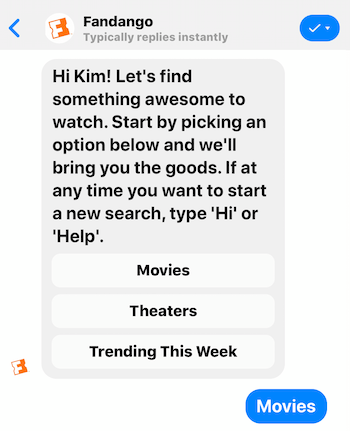 A common misconception about chatbots is that simply having the word “bot” in the name makes it AI. This is not the case. Most chatbots currently available now, whether used for customer service, auto-responses, or sales, heavily rely on human-powered branching logic and series of if-then statements to function.
A common misconception about chatbots is that simply having the word “bot” in the name makes it AI. This is not the case. Most chatbots currently available now, whether used for customer service, auto-responses, or sales, heavily rely on human-powered branching logic and series of if-then statements to function.
Paul admits that setting up chatbots can be a brutal and overwhelming experience. He says it's like setting up an email workflow for 100,000 people in an automation tool. In some cases, a human being still needs to set up all of the rules for the chatbot and continue to maintain and update those rules moving forward.
Chatbot technology with AI-powered capabilities within it can eliminate the need for humans to set up and update these rules. To find out if a chatbot technology supports these capabilities, ask questions about how the company is using natural language processing and machine learning to make things more efficient for you.
Natural language processing means the technology processes the meaning behind a question or statement as it's naturally spoken or typed, then generates a correct response or recommendation. Machine learning is when the technology can determine which recommendations are actually helpful and automatically eliminate those that aren't. Then, the chatbot adapts all future recommendations based on this information. The key is that the chatbot technology is processing, learning, and adapting entirely without a human having to track each interaction and manually adjust a rule.

Discover Proven Marketing Strategies and Tips
Want to go even deeper with your marketing? Check out the Social Media Marketing Podcast! Publishing weekly since 2012, the Social Media Marketing Podcast helps you navigate the constantly changing marketing jungle, with expert interviews from marketing pros.
But don’t let the name fool you. This show is about a lot more than just social media marketing. With over 600 episodes and millions of downloads each year, this show has been a trusted source for marketers for well over a decade.
I disclose that I am pretty familiar with today's major chatbot providers and most don't offer these advanced AI-powered features to small businesses. Some providers currently offer natural language processing and machine learning capabilities to enterprise-level customers. So you can expect the technology to become readily available, more affordable, and broadly available soon.
If you don't have a chatbot, get a chatbot. Even if you're manually powering the branding logic, it will prepare you for when AI technology inevitably expands to more businesses.
Content Strategy
Content strategy comes down to making predictions about what to write about, how often to publish, which keywords to use, and so forth. Traditional content strategy is evolving and there's a lot of money going toward the development of tools and platforms that apply machine learning to eliminate the speculation.
For instance, HubSpot was one of the first to implement machine learning in their content strategy tool to do content clustering. Put in a word and the tool recommends other topics related to it from within the site. It then surfaces the direct links for you.
There are other opportunities to use AI to do things like look at multiple data sets on when people search for certain things and signal when your company should be posting about their products. It can help you determine which keywords to use or perhaps even write content for you at some point in the future.
This technology might replace a lot of consultants down the road, but it will also create massive opportunities for consulting with companies on how to use AI to do content strategy.
Social Ads
Automatic ad placement on Facebook, Google, and other social media platforms is another area where AI can help. If you manage a Facebook page, you've probably seen the prompts that ask, “Do you want to run this ad?” It has the image and text from one of your posts. All you have to do is continue to build the Facebook ad based on Facebook's recommendation on what it thinks will do well. This functionality is completely powered by AI.
Photos and Video
Each week on this podcast, Erik Fisher highlights a tool or app. Many that have been shared recently use AI to enhance photos or remove people or objects from the background with the click of a button.
Paul mentions a tool he used in his presentation at the Marketing AI Conference that took his daughter's drawing and converted it into a Picasso in 30 seconds. We discuss Face App, which takes present-day photos of users and ages them younger or older. Deep fake video is another example of how AI can improve, enhance, or manipulate images and video.
Monitoring and Reviews
Tracking social media monitoring and reviews is another process that AI technology can simplify and manage, especially for small businesses and franchises where reviews play such a huge role in search. Both tasks have historically been enormously time-consuming, especially if you get into sentiment analysis and prioritization of which ones to respond to.
There are so many vendors for each of these that marketers can literally just pick a use case and add “AI-powered social monitoring tool” or “AI-powered social ads” and the search to find someone. Paul advises looking for very narrow, specific use cases to find an ideal fit for your company.
AI-Powered Marketing Software and Tools
Paul offers different resources and tools that leverage AI to improve your marketing, email campaigns, and social media ads.
CRM Platforms
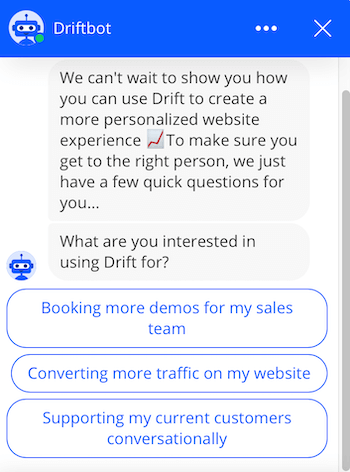 The best way to learn more about AI is to start with the technology you already have such as your CRM and automation platform. If you're using any of the major ones available to marketers, there's a really good chance it has AI-powered features that you may not have turned on or even know about yet.
The best way to learn more about AI is to start with the technology you already have such as your CRM and automation platform. If you're using any of the major ones available to marketers, there's a really good chance it has AI-powered features that you may not have turned on or even know about yet.
For instance, users of the conversational marketing tool Drift can start by using the custom chatbot capabilities offered with its Pro, Premium, and Enterprise plans. Similar platforms include Conversica, LivePerson, and HubSpot, each with their own conversational AI technology or a chatbot builder for driving customer service. Almost every major tech company is integrating chat in some way. Platform companies are either building chatbots or integrating a third-party chatbot.
Yext
For tracking social media monitoring and reviews, Paul suggests Yext. It can process vast amounts of information, understand what's being said within it, and use different models to prioritize to whom you should respond.
Yext also enables business data for Amazon's Alexa. If you query an Alexa-enabled device about the business hours of a local establishment, Yext is the technology powering those business listings and providing key pieces of information to users of voice technology.
Listen to the show to learn more about creating an account for your business on Yext and making it discoverable in voice search.
Rasa.io
Email platforms like Drip and MailChimp could use AI to provide list segmentation, predict fatigue, learn the best time to send to individual recipients, and so much more. While there are ways to jerry-rig the features and functionality currently offered with Drip and MailChimp, Paul finds these workarounds kludgey.
He recommends Rasa.io, an email platform that creates automated personalized content in newsletters. In theory, every newsletter is sent at a prioritized time for each recipient. It then learns which links the user clicks and eventually starts adapting the links it includes in future newsletters based on this information. So every newsletter it sends could be different from any other.
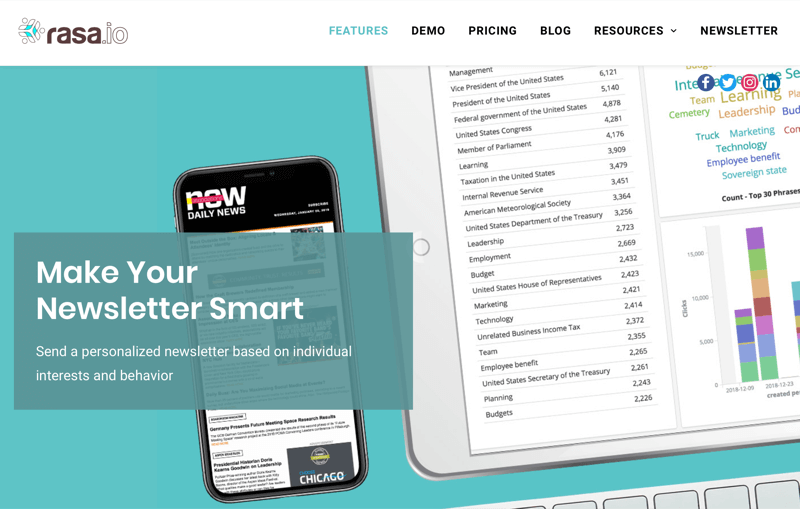
Pattern89
Pattern89 is marketing software that applies AI to designing optimized ads for social media and Google. It eliminates the complexity and guesswork of using bid, budget, and channel management to monitor and optimize your creative, especially at scale.
Pattern89 uses machine learning to provide an intelligent analysis of your ads' performance data across all ad platforms and predicts which creative and channels will likely perform best. Functioning as an assistant, it then provides recommendations on how you should allocate your budget and allows you to make any changes with the click of a button.
I add that in the near future, this application of AI could eliminate social media management tasks and activities performed by full-time staff or consultants. It certainly disrupts any digital media-buying jobs or functions within a company or agency.
While Google and Facebook haven't yet built a recommendation tool akin to what Pattern89 offers, the technology is advancing. Google Analytics has branched out into providing alerts for any anomalies in your insights and analytics. It then asks, “Was this helpful? Yes or no.” Every time you click “yes,” you've just trained the machine learning model to find more anomalies like that one.
Persado
Persado recently made a big deal with JP Morgan Chase to create content for social ads using natural language processing and generation technology. They're now expanding their partnerships and using AI to write content across other channels.
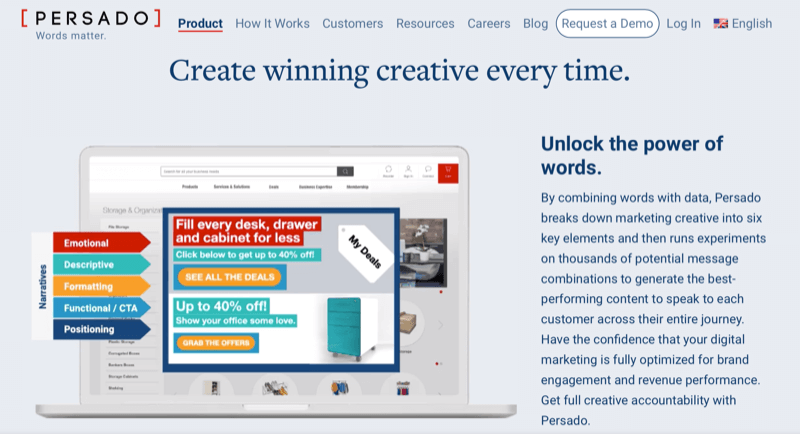
One of Paul's original use cases for AI was writing blog posts. While there have been some leaps forward, he has been following advancements in this area since 2015 and doesn't think AI is anywhere close to being a major disruptive force to creative writing. However, there's an opportunity for AI-trained technology when it comes to writing formulaic, data-driven content such as financial reports and analysis, sports reporting, product descriptions for eCommerce, or election coverage.
Phrasee
Phrasee, a marketing platform similar to Persado, uses AI to handle email subject lines that outperform human-generated ones 98% of the time. It needs 100,000 emails for the machine to learn from but then the machine will actually start writing email subject lines based on the body of your email. Phrasee functions as an editor, looking at the content and generating email subject lines that generate engagement and high open rates.
Additional Resources
Paul's company tracks more than 1,200 AI-driven tools and marketing platforms and has profiled 55–60 of them on the Marketing AI Institute. They spotlight companies by asking them the same eight questions and compiling the answers in a Marketing AI Buyer's Guide.
His company also publishes a newsletter that curates the “Best of” from around the web and publishes five to seven original, long-form articles a week on its site that make AI approachable and actual. The newsletter comes out every Tuesday and Thursday. Every July, they hold the annual Marketing Artificial Intelligence Conference (MAICON), where people can learn even more.
Discovery of the Week
EmojiCopy is a free, web-based app that has search functionality and the option to create a line of emojis all at once. Instead of having to find and add one emoji at a time to your message, you can easily use this site to select as many emojis as you like with a click of your mouse or tap of your finger. Then quickly create a string of emojis that can be copied and pasted anywhere on the web.
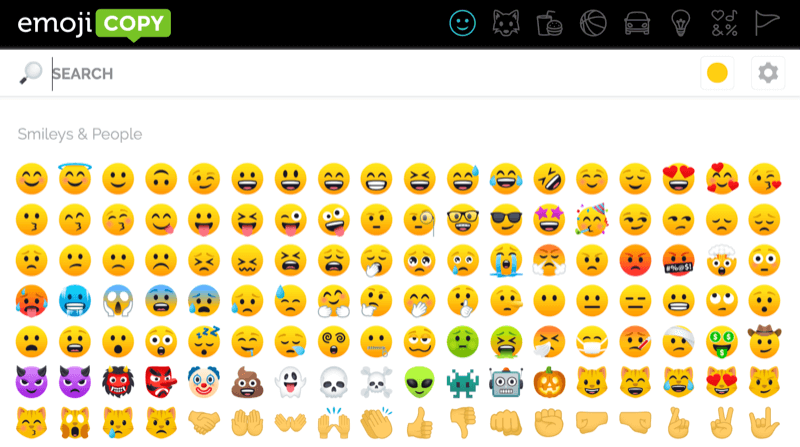
EmojiCopy works on both desktop and mobile devices and can be accessed from the site, EmojiCopy.com.
Listen to the show to hear more about EmojiCopy.
Key Takeaways From This Episode:
- Follow Paul on LinkedIn or find him on Twitter.
- Learn more about PR 20/20.
- Listen to the Marketing AI podcast.
- Discover the Marketing Artificial Intelligence Institute.
- Find out more about the Marketing Artificial Intelligence Conference (MAICON).
- Read Automate This by Christopher Steiner.
- Explore Paul's book, The Marketing Performance Blueprint.
- Examine Drift, Conversica, LivePerson, and HubSpot.
- Check for your business on Yext.
- Send smarter emails with Rasa.io.
- Optimize your social media and Google ads with Pattern89.
- Let Persado handle your formulaic writing.
- Try Phrasee for generating engaging email subject lines.
- Discover dozens of AI-driven tools and marketing technology platforms from the Marketing AI Buyer's Guide.
- Check out EmojiCopy.
- Learn more about the 2019 Facebook Ads Summit at FBSummit.info.
- Watch our weekly Social Media Marketing Talk Show on Fridays at 10 AM Pacific on Crowdcast.
Help Us Spread the Word! Please let your Twitter followers know about this podcast. Simply click here now to post a tweet.
If you enjoyed this episode of the Social Media Marketing podcast, please head over to iTunes, leave a rating, write a review, and subscribe. And if you listen on Stitcher, please click here to rate and review this show.
What do you think? What are your thoughts on using AI in your social media marketing? Please share your comments below.
Attention Agency Owners, Brand Marketers, and Consultants

Introducing the Marketing Agency Show–our newest podcast designed to explore the struggles of agency marketers.
Join show host and agency owner, Brooke Sellas, as she interviews agency marketers and digs deep into their biggest challenges. Explore topics like navigating rough economic times, leveraging AI, service diversification, client acquisition, and much more.
Just pull up your favorite podcast app, search for Marketing Agency Show and start listening. Or click the button below for more information.

